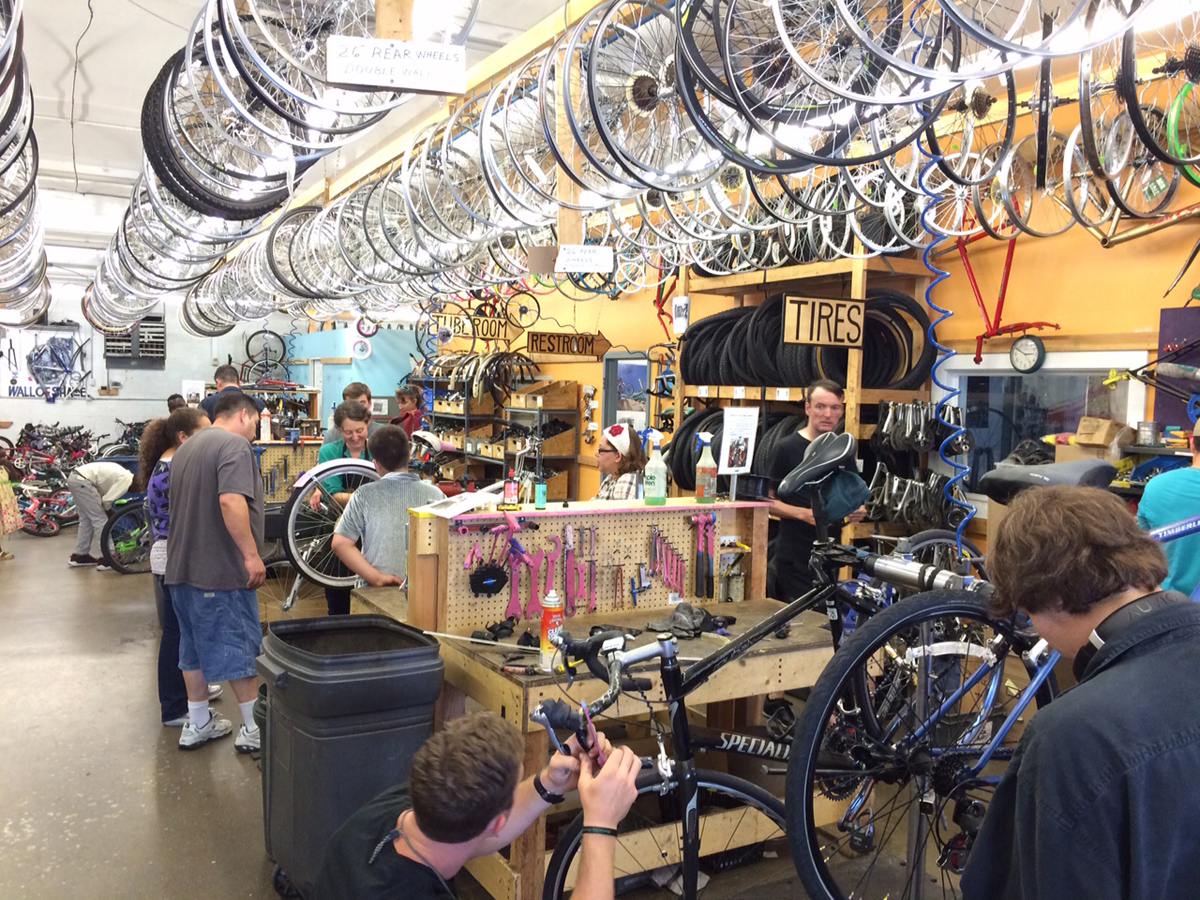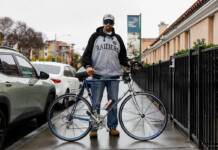By Lou Melini — It was in April of 2002 that 6 bicycle enthusiasts/advocates founded the Salt Lake Bicycle Collective. Founders Jason Bultman, Brian Price, Brenton Chu, Jonathan Morrison, Edward Whitney, and Jesse Ratzkin set out to share the virtues of bicycling with the community and build the bicycling environment with a creative advocacy organization. In addition they provided the gathering place, tools, education, art projects, and shop services. The Collective is about having fun while helping others.
On August 1st of 2016, Clint Watson became the new Executive Director of the Collective, inheriting the growth that has taken place since 2002. I met up with Clint in last November as a volunteer at the Collective to see first hand the good work that the Collective performs.

Cycling West: When did the Collective form? What was the basis of its formation?
Clint Watson/Bicycle Collective: The Bicycle Collective was conceived and initially organized by a group of bike enthusiasts who met through critical mass rides and other bike events. They shared three common beliefs: 1. That bicycles are more than a toy, but an effective and sustainable form of serious transportation. And 2. The cost of a new bicycle was a barrier to many people who would otherwise be inclined to ride, and 3. The Wasatch Front was littered with older bikes in garages that could be rebuilt into perfect commuters and many people would donate their old bikes to the right cause. 15 years later it appears that they were exactly right on all three counts. Over the past decade and a half the Collective has refurbished tens of thousands of bikes and given them a new life and in doing so provided reliable transportation and true mobility to an impressive number of people.
CW: Since 2002, the Collective has expanded to various locations and along with that the governance. Can you touch on that?
BC: We now have fully operational and revenue-positive (i.e. self-sustaining) locations in Salt Lake, Ogden, Provo and Westminster Campus. We’re also exploring a new location in St. George. The expansion happened very rapidly from one location to what we have now in 2015 and it has brought along with it governing challenges that we’re in the process of normalizing and making great headway. The structure of the Collective is that of any standard 501(c)3 nonprofit: we have a board of Directors who are volunteers and establish the policy and overall direction of the organization, and they hire an Executive Director (myself) whose job it is to implement the vision system-wide. A Director who oversees a staff of mechanics and program coordinators and a huge group of enthusiastic volunteers manages each location.
CW: What is the mission of the Collective? How has the Collective managed to maintain the mission over the years?
BC: The mission of the Bicycle Collective is to promote cycling as an effective and sustainable form of transportation and the cornerstone of a cleaner, healthier, and safer society. The Collective provides refurbished bikes and educational programs to the community, focusing on children and low-income communities.
At present our Board of Directors is in the process of reviewing our governing documents and creating a strategic plan to guide us through the next 5 years, and in the process we took a critical look at the mission. It turns out we the mission as written captures what we do and why so well we find that we’re naturally inclined toward working toward it and thus it’s staying in place as is.
CW: Tell me about your background, how you became involved in the Collective and how you progressed to your current position.
BC: I got involved with the Bicycle Collective at the organization’s first annual board meeting in 2003 where I was invited to join the Board. Over the years I have served as board member, keylist volunteer, LCI course instructor, and Program Developer. I also worked for a few years with the Boise Bicycle Project as Volunteer Coordinator and Program Director and as a shop mechanic. In 2015 I rejoined the Bicycle Collective as the first full time satellite location Director in Ogden and directed the renovation of the building as well as revived our programming and community shop in Ogden that had taken a 3-year hiatus. In August of last year I was hired as Executive Director, overseeing operations and general management of all Bicycle Collective locations.
I’m a Utah native, fourth generation, born in Spring City. I grew up on a sheep farm and spent a lot of time outdoors, particularly in the mountains in the Manti-LaSal range where I developed a deep love of nature. My parents still live there and I love to visit; it’s still a quiet community that isn’t experiencing much growth and that’s the way they like it. I attended Snow College and the University of Utah and have worked previously as a Special Ed instructor and a Librarian at SLC Public Library. I feel like the community bike shop field is really where my heart has lead me and I couldn’t be happier to have the opportunity to navigate this organization through a young and growing field in the nonprofit sector.
CW: What programs have survived the test of time over the years? What are some of the current programs? What keeps these programs functioning?
BC: Our core programs are:
-
- Community Bike Shop
- Goodwill Bike Giving Program (for adults and youth)
- Bike Valet
- Youth Programming (formerly “Earn-a-bike”)
- Mountain Bike Camps
All of these have been around for at least 10 years, though they have evolved somewhat and I hope to see them continue to do so. I believe strongly that we should be doing things because they work and are fulfilling a need in the community, not because of tradition or personal agenda. The key element that keeps each of them functioning is the driving need in the community—with many of these programs people don’t know they need it until we start offering it, and then it becomes indispensable. Take Bike Valet for instance: we park 800-1,000 bikes at every Twilight Concert show during the summer. That’s a burden of 500-1000 parking spaces that we’re reducing on the event. Many people might not assume that having someone watch your bike in a secure location while you enjoy downtown life is a necessity, but once they realize it exists they use it! And because it’s used so much it’s actually taken into consideration now when new events are planned; we’re helping redefine the way people think about getting around in the downtown area.
By far our most deeply rooted program is the community bike shop that we operate in Ogden, Salt Lake, Provo and Westminster. These have opened the door to thousands of people who wouldn’t be able to afford a bike or service otherwise, empowering them to learn how to maintain their own bikes and providing the tools necessary to do so. And the revenue we generate in the bike shop is what pays for all of the other cost-intensive charitable programming that we offer, so shopping with us is a win-win: you get what you need to be a bike commuter, and you’re supporting programs that offer the same to low income individuals in the process.
CW: What is the number of employees and what is the volunteer level at the Collective?
BC: We currently employ 25-30 people across the state, depending on the time of year. Employees do the bulk of the work on bikes we sell (for liability reasons among others) and they do most of the coordination work for programs and volunteers.
Volunteers, on the other hand, get to do most of the fun work. Volunteer jobs range from working on bikes for giveaway (we sent more than 3,000 refurbished bikes out the doors last year to people in need), to helping with youth programming, valet assistance and outreach, or helping as a greeter at one of our open shop shifts. Volunteers are the lifeblood of our organization as they are with most nonprofits and we could not do the work we do on the scale we do it without logging thousands of volunteer hours every year.
CW: My wife Julie is an Executive Director of a non-profit. Funding is always critical to the sustainability of an organization. How has the Collective become sustainable? How does one become a Member of the Collective?
BC: We’re very fortunate in this regard. Because we run a “thrift shop for bikes” we have a built in mechanism for converting in-kind donations into funds in a big way. Approximately 70% of our income is generated in house, with the final 30% coming from foundation grants, fundraising, and corporate giving.
And yes! You can now become a member of the Bicycle Collective! Membership starts at $50 per year and gives you access to our community shop stands and tools year-round with no hourly charge (normally $10/hour). Other benefits include discounts on parts and accessories and an invitation to be a part of the community and help us focus our direction as an organization to make sure we’re meeting the needs of the communities we serve. Anyone can join at donate.bicyclecollective.org
CW: In addition to becoming a Member, what can the community do for the Collective? What are some creative or simple help that people can do?
BC: Bikes and parts are always a huge need and I take every opportunity I can to remind people that their old bike in the garage is a valuable asset to the work we do and to the people we serve who can’t afford a car or even a bus pass sometimes. And all donations made to us are tax deductible, so please, please keep us in mind for those donations.
In addition to those, we need all kinds of things: office/computer equipment, retail and display hardware and storage equipment, or even snacks for volunteer nights! The most generous donation we’ve received in recent memory was a vehicle from UTA. But that’s a rarity and really, it’s the day-to-day donations that help us keep the doors open. Anything that would be useful at any business is probably something we could use.
More information on the Bicycle Collective and its programs can be found at: www.bicyclecollective.org
To read more about the history of the Bicycle Collective, see https://www.cyclingwest.com/advocacy/the-bicycle-collective-celebrates-10-years-of-making-rides-happen/








